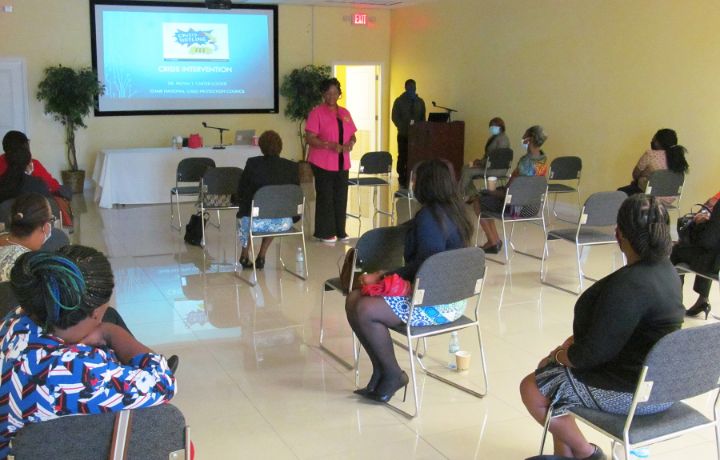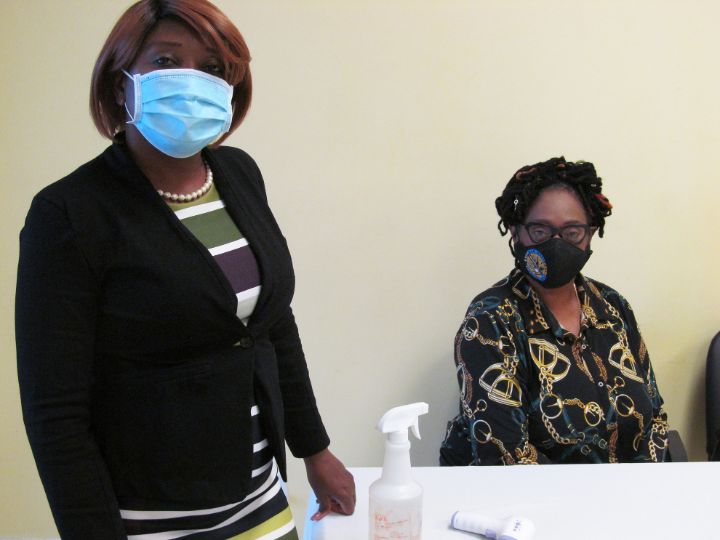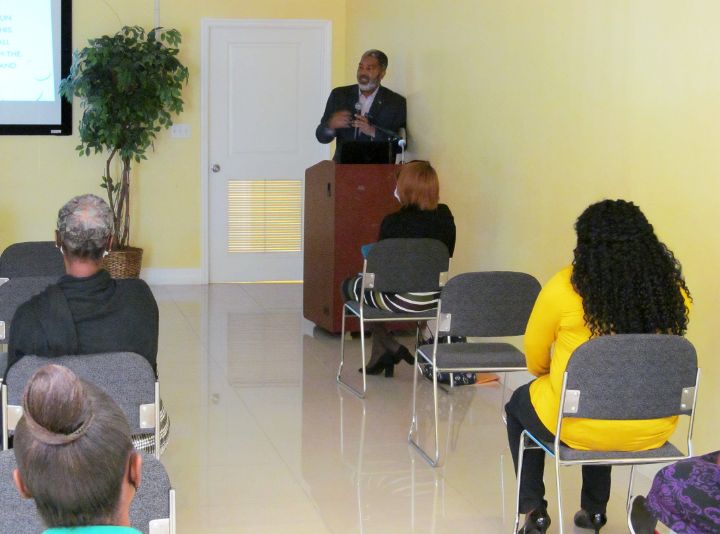|
From:TheBahamasWeekly.com Bahamas Information Services Updates
Nassau, The Bahamas – Officials of the Ministry of Social Services and Urban Development, its Department of Social Services (DOSS) and Child Protection Unit; the National Child Protection Council (NCPC), and The Bahamas Crisis Centre, teamed up to host a two-day Crisis Intervention Training Seminar for DOSS Hotline Workers and those team members aspiring to become Hotline Workers. Conducted by noted psychologist Dr. Novia T. Carter-Lookie, the two-day seminar examined a number of areas including: Domestic, or Intimate Partner Violence and its negative impacts and Gender-Based Violence and its negative impacts, in addition to barriers to reporting, and a presentation on suicides that covered a wide range of discussion -- from Myths and Facts About Suicide, Knowing the Signs of Suicide, to the Common Errors of Suicide interventions, among others. Dr. Carter-Lookie has conducted numerous seminars and workshops on child abuse, pornography, violence against women and children, crisis intervention, suicide prevention/intervention, parenting with dignity, and the Five Love Languages across The Bahamas, and is Co-chairperson of the National Child Protection Council, the Director of the Bahamas National Drug Council, the Director of the Children Advocacy Clinic of The Bahamas Crisis Centre, and a Consultant Psychologist with the Suspected Child Abuse and Neglect (SCAN) Unit of the Ministry of Health.
The training was facilitated Face-to-Face in New Providence – adhering to all of the protocols established by the Ministry of Health to limit/stop the community spread of COVID-19 -- and virtually for team members in the Northern Bahamas, Grand Bahama in particular. It further allowed facilitators to ensure that the mental well-being of the Hotline Workers was simultaneously being looked after as Dr. Lookie said the work manning Hotlines: “May lead to distress or vicarious trauma” for the Hotline Workers themselves due to the nature of some of the calls. The workshop highlighted the conceptual overview of crisis intervention and summarized the steps Hotline Workers may use to identify, assess, and intervene with an individual experiencing crisis. The training was based on the U-Talk Hotline training which encourages Hotline Workers to embrace the opportunities they are afforded to provide emergency psychological First Aid. This assistance in many instances “decreases psychological pain and prevents suicidality.” The U-Talk Hotline training provided DOSS hotline workers with the knowledge, skills, and abilities to enhance the services currently provided by Department of Social Services hotline workers.
Minister of Social Services and Urban Development, the Hon. Frankie A. Campbell, said the training was in continuation of the Ministry’s objectives to prepare team members to address, adapt to, and respond to ever-changing requirements of clients as a result of the negative socio-economic impact of the COVID-19 Pandemic, and the preceding fall-out from the ravages of Hurricane Dorian – all within the past 24 months. “The circumstances of life are weighing heavily on certain members of our citizenry – some of whom are really and truly depressed -- as a result of the negative fall-out from Hurricane Dorian and the COVID-19 Pandemic,” Minister Campbell said. “As the humanitarian arm of the government, we have the duty and the responsibility to save lives on the front end in terms of providing the basic necessities of life (food, clothing, shelter) to those citizens qualifying for that assistance, but in addition to the physical and tangible necessities, we find that addressing the psychological needs of our citizenry has become very important. “I want to commend the organizers for the timeliness of the training as it is important that we are all on one page, singing from the same hymn sheet. It is important that all of the agencies are following the same playbook so that there is no lapse in time in terms of our responsiveness; that there is no lack of knowledge in terms of what the practices are, and that there is no lack of sensitivity as a result of a lack of knowledge and so this is beautiful.” Minister Campbell said Dr. Carter-Lookie’s presence, her work with the NCPC, the Bahamas National Drug Council, The Bahamas Crisis Centre, SCAN and the country’s law enforcement agencies and other government and non-governmental organizations, will help to advance uniformity. (The Bahamas Crisis Centre also manages a Hotline in addition to all of the work they do with regards to ending all forms of violence – but gender-based/domestic/intimate partner violence and violence against women and girls in particular, in the country.) “It is important that we, all of the agencies involved, have that same uniformity in terms of our response and our responsiveness,” Minister Campbell said. “And so, as the humanitarian side of the government, it is good that we are doing what we are doing. As a profession, it is good that we are doing what we are doing for the sake of our citizenry.” Dr. Carter-Lookie said manning Hotlines can be rewarding for many Hotline workers, but for some, the confrontation with “suicidality,” abuse, and loneliness in combination with inappropriate calls – that is sexually abusive calls -- may lead to “distress or vicarious trauma.” “Their work, on the one hand, can have positive effects on their mental wellbeing such as compassion satisfaction -- the pleasure experienced by caring for others and job satisfaction. However, Hotline Workers are also exposed to negative effects. For example, Hotline Workers can experience elevated symptoms of anxiety and depression, symptoms of burnout, secondary traumatic stress (experience of emotional disruption due to helping a traumatized person), and compassion fatigue (the physical, emotional, and psychological effects of exposure to traumatic stories or events). “That is why it was important for us to explore the duality of their work (which includes the potential for how those workers can be negatively impacted) during this Crisis Intervention Training.” Mrs. Seanalea Lewis, Chief Welfare Officer, Child Protection Unit, Department of Social Services, organized the training, along with Dr. Carter-Lookie. Mrs. Lewis said skilled training in the proper techniques used to monitor National Hotlines is essential to ensuring that the persons utilizing those services receive quality service each time, and that the emotional/mental health needs of the persons answering those phone calls, are also addressed. “Over the years, and indeed particularly over the past 24 months, we (operators of the Department of Social Services Hotline Service) have seen an increase in, and expansion of those services to include providing emotional support, crisis and basic needs interventions and in some cases suicide prevention as a result of the fall-out from Hurricane Dorian and the COVID-19 Pandemic. “Additionally, Hotline personnel can themselves face potential stress and trauma from taking so many repeated and frequent calls. Strategies to mitigate these negative impacts are critical. This Hotline training, I believe, will provide our Hotline personnel with the skills that are essential to not only provide the Hotline users with the requisite service, but to also maintain their own mental health well-being,” Mrs. Lewis added.
|


